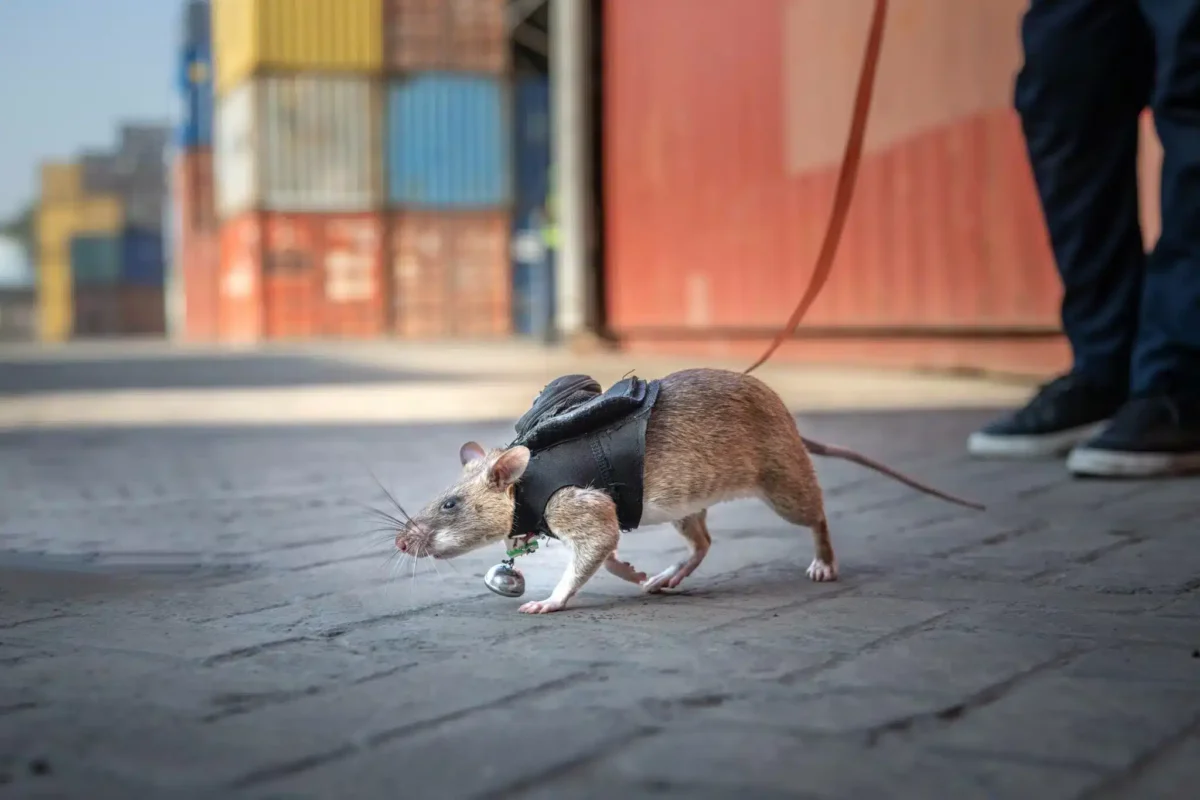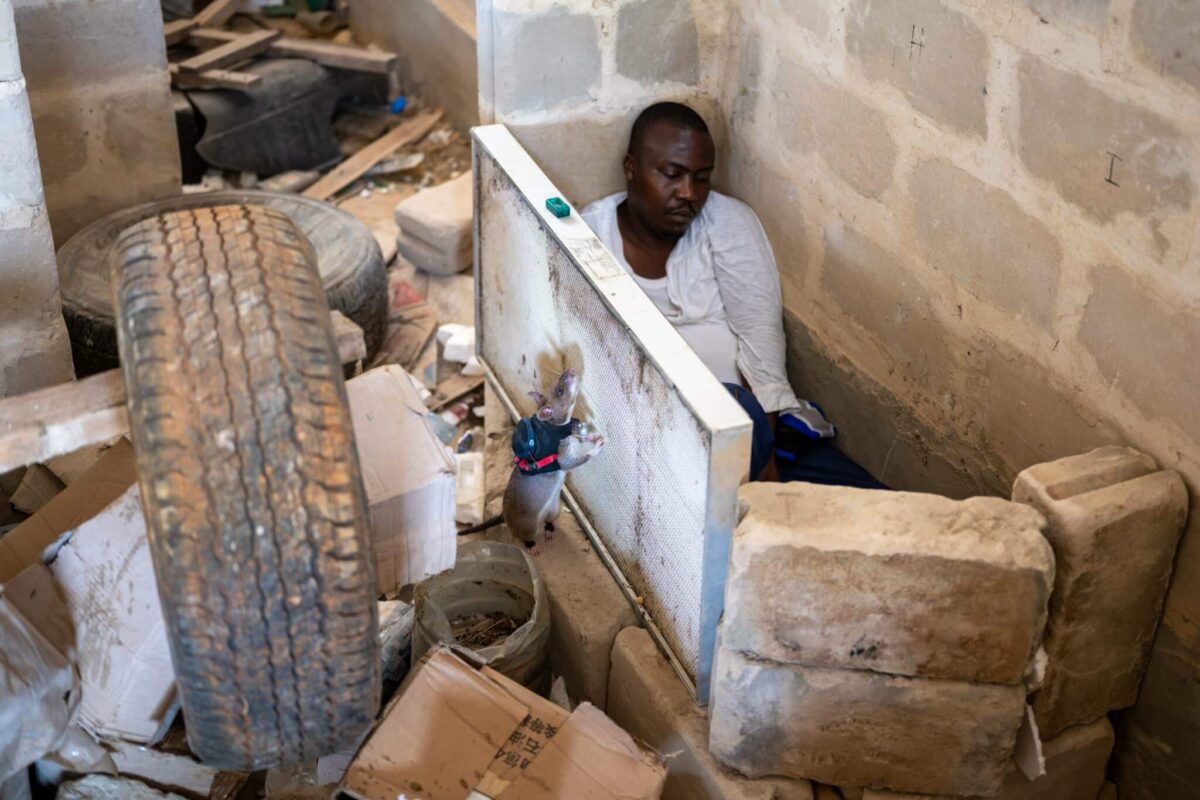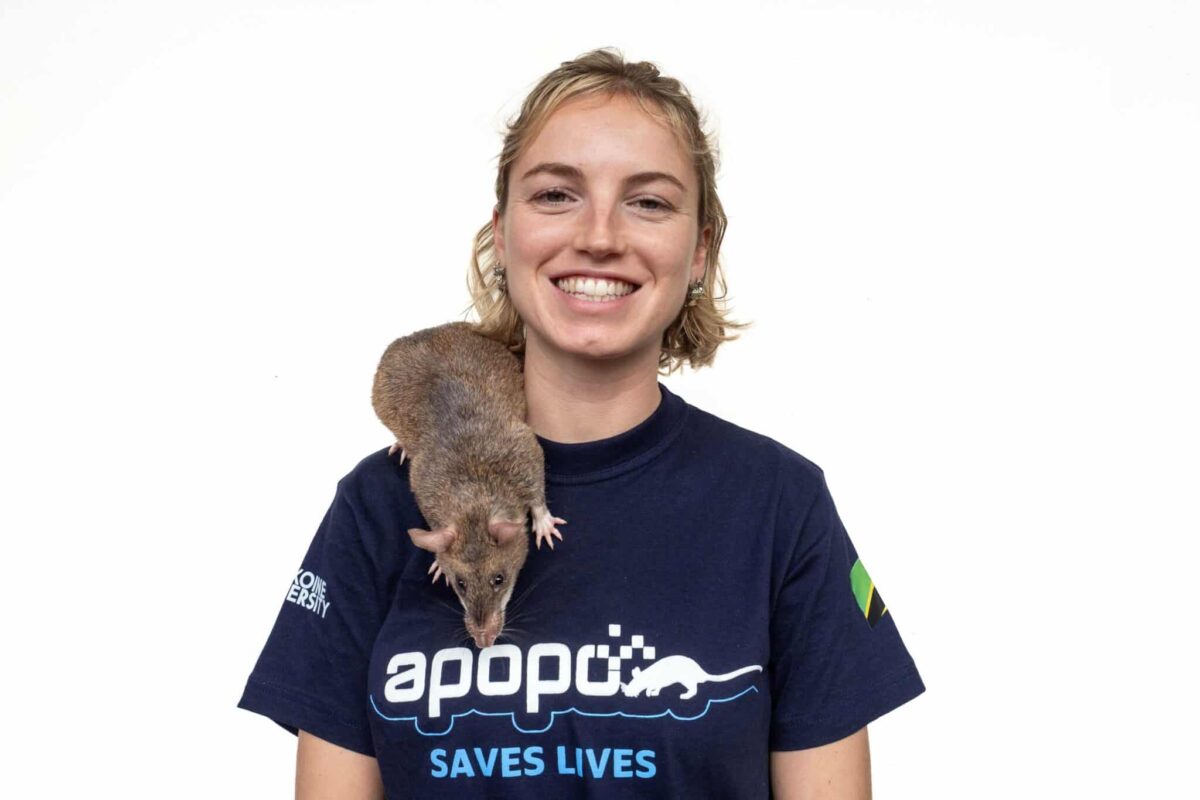At APOPO, innovation has always been at the heart of our work. From the very beginning, training rats to safely detect landmines was itself an innovation, and more than 25 years later it remains a core focus of our mission. Today, APOPO continues to explore new ways our HeroRATs can save lives and protect the planet. Leading this effort is Alice, APOPO’s Head of Innovation, whose role bridges research and real-world application. Alice brings global experience in social enterprise, climate action, and humanitarian work to her role, where she turns creative ideas into practical solutions.
Her journey into innovation is as diverse as it is inspiring. From working with refugees in Greece to advising governments in Sub-Saharan Africa, Alice has always sought new ways to connect people, ideas, and technology to tackle complex challenges. Now at APOPO, she is helping pioneer projects like Wildlife Detection and RescueRATs, keeping innovation as a core focus of our mission and proving that bold ideas can create lasting impact.
Read on to get Alice’s story in her own words:
Q&A with Alice Sparks
Can you share a bit about your background and how you came to work in innovation?
I would describe my career as a mix of curiosity, strategy, and wanting to make a difference. Innovation has been the common thread, even before I realized it. I started by founding Invisible Manchester, a social enterprise that trained people who had experienced homelessness to become walking tour guides. That experience taught me everything from project management and financial planning to building relationships and measuring impact. Since then, I have worked on international projects, from teaching refugees in Greece to delivering renewable energy programs in Sub-Saharan Africa. With GIZ, I advised local governments on climate action and urban energy systems, which gave me insight into how innovation can work on both a technical and policy level. Along the way, I have developed skills in problem-solving, adapting to new contexts, and communicating complex ideas to diverse audiences. Growing up across multiple countries and living in Belgium, Rwanda, and now Tanzania also gave me the confidence to work across cultures and in challenging environments. For me, innovation is about creatively connecting people, ideas, and technology to create impact, and that is what motivates me every day.
What brought you to APOPO, and what appealed to you about our mission?
It was a mix of personal history and professional passion. As a teenager, I kept pet rats named Rufus and Samuli, never imagining that experience would shape my career. When I applied to APOPO, I even wrote, “P.S. I used to own pet rats when I was younger, so this is somewhat of a dream job.” APOPO’s mission appealed to me because it uses innovative science to save lives and address both humanitarian and environmental challenges. For me, it is the perfect intersection of curiosity, problem-solving, and real-world impact. The moral of the story: let your kids have unusual pets, you never know how it might influence their future.
How would you describe your role as Head of Innovation?
My role is varied, and no two days look the same. I handle logistics, financial planning, partnerships, and new opportunities. But my main responsibility is to take the proof-of-concept work from our researchers and turn it into real-world solutions. The researchers figure out how and why the rats work, and I focus on operationalizing it, making sure it can actually be deployed. For example, with Wildlife Detection Rats, I have been working on deployment packages to show how they could be used at airports and seaports. In short, I help bridge the science and the operational side so that the impact we know is possible actually happens.

What does innovation mean at APOPO?
Alice: Innovation at APOPO means creativity, courage, and being willing to try new things, even if they don’t always succeed. The organization itself began as an innovation project, and over 25 years we have stayed relevant by adapting and evolving. In practical terms, innovation is about building new programs from scratch. For example, we have never trained a rat to roam freely through a post-disaster site, so we are figuring out how to make that work. The Innovation team takes decades of experience and applies it to new problems, creating solutions that are both effective and unique.
Where do you see the most potential for innovation at APOPO?
Alice: I see great potential in environmental applications. Soil remediation is one example that excites me. Traditional approaches often require large-scale excavation and off-site disposal, which are costly, carbon intensive, and damaging to infrastructure. By leveraging the rats’ scent detection abilities, we could make the process more accurate and affordable. This would reduce unnecessary excavation, cut emissions, minimize landfill burden, and protect habitats. The project is still in the early stages, but I am excited to see it progress. It is a good example of how APOPO can apply our expertise in scent detection to new sectors.
What projects are you especially excited about right now?
Alice: I am particularly excited about the RescueRAT documentary we are producing with the Swedish Postcode Foundation. It is a chance to tell the story of the program and highlight the hard work of the team. The scenes and interviews look fantastic, and I am eager to see how it all comes together. Beyond being a storytelling opportunity, the documentary will be a big boost for the program, helping us showcase its impact to a much wider audience.

What makes projects like Wildlife Detection and RescueRATs unique?
Alice: With Wildlife Detection, what I love is that animals are helping other animals. Our rats help intercept illegal wildlife trafficking, which protects endangered species. That feels powerful. With RescueRATs, their size and agility give them access to spaces people and dogs cannot reach after disasters. They fill a gap in current search and rescue practices, and while the project is still developing, the idea that rats could one day help save human lives after earthquakes or building collapses is incredibly motivating.
What challenges do you face when introducing new ideas?
Alice: Challenges come at every stage, from funding and logistics to ensuring the idea fits with APOPO’s mission. We ask questions like: Can we get the right samples? Can we secure funding? Is it practical for a rat to do this job? To test new ideas, we start by proving the rats can detect the scent, then run controlled tests, and finally pilot in field-like conditions. Only then do we look at scaling and funding. It is a step-by-step process that balances scientific validation with operational needs.
How do new ideas usually get tested or piloted?
Alice: We begin with proof of principle: can the rat detect the scent? Then we set up controlled experiments to test accuracy. If that works, we move to conditions that mimic real-life situations. Finally, we look at whether it can be scaled and whether it aligns with APOPO’s wider mission. It is about balancing science, practicality, and strategy.
What kind of collaboration goes into developing something new?
Alice: Collaboration is essential. Innovation at APOPO involves researchers, trainers, field staff, funders, and often external partners. Each group brings a different perspective, from science and training to logistics and strategy. Working together ensures that new ideas are not only possible in theory but also practical in the field.
How do you balance ambition and practicality in tough environments?
Alice: For me, it is about keeping the end goal in mind. Every small step, even resolving a visa issue for a colleague, contributes to the bigger mission. Balancing ambition and practicality means being ambitious in vision but realistic in execution.
Are there any potential future uses for the rats that might surprise people?
Alice: We are always exploring new ideas, even the weird and wonderful ones. If anyone reading this has a challenge they think our rats could uniquely solve, I would encourage them to get in touch with me at alice.spaks@apopo.org.
Are there tools or technologies you are watching that could shape APOPO’s work?
Alice: I am watching the development of electronic noses, or e-noses. Interestingly, I think APOPO could help shape how they develop. Our deep understanding of odor detection, training, and application in the real world could guide how e-nose technology is used. Rather than replacing our work, technology could complement and even be shaped by it.
What has been a memorable moment for you since joining APOPO?
Alice: My first arrival in Morogoro is something I will always remember. Seeing the Uluguru Mountains at sunset was breathtaking. Life here is very different from London, from running in the mountains and seeing monkeys on my way home to enjoying vitumbua (sweet rice cakes). It quickly felt like home. On the work side, watching young RescueRATs in training has been a highlight. Seeing how quickly they learn is rewarding. Visiting the team in Turkey was also special, knowing the rats I had seen in early training had made it all the way there and were now advancing in real disaster simulations.
Is there anything you wish people better understood about innovation in a humanitarian context?
Alice: That passion is what fuels innovation. It is not about flashy technology, it is about people with limited resources finding creative solutions that make a real difference on the ground.
Looking ahead, what excites you most about APOPO’s innovation work?
Alice: I am inspired by the fact that APOPO began with a single innovative idea and has remained relevant for more than 25 years. That is rare in the NGO world. Looking forward, I am hopeful about the many ways our expertise in scent detection can expand into new areas, from humanitarian action to environmental challenges. I am both curious and motivated to be part of that journey.
What kind of support or collaboration could help bring new ideas to life?
Alice: Collaboration with partners who share our vision is key, whether that is funding support, access to research opportunities, or practical help in testing new ideas. The more perspectives we can bring together, the more likely we are to succeed in creating solutions that work.

